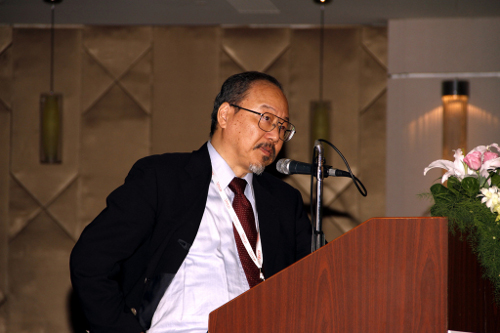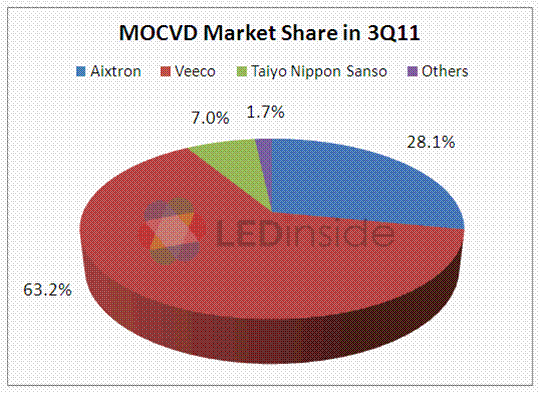Recently, the competition in the MOCVD market is getting fiercer; aside from the two forerunners Aixtron (Germany) and Veeco (America), other players are trying to make inroads into the market. TAIYO NIPPON SANSO CORPORATION, established in 1910, is the biggest industrial gases and air separation unit supplier in Japan, ranking number 5 among the global industrial gas suppliers. As for MOCVD equipment, the top 3 MOCVD makers in the world, which account for 98.4% of the market share in 2010, are Aixtron, Veeco and Taiyo Nippon Sanso (Japan). Noteworthily, even though Taiyo’s market share (5.9%) is far less than those of Aixtron and Veeco, it possesses 70-80% of the market share in Japan, making it the largest MOCVD equipment maker in Japan.
LEDinside not only invited Koh Matsumoto, Ph.D., the president of TAIYO NIPPON SANSO EMC Ltd. , to share the technology enhancement of LED equipment and dissect the LED industry at LEDforum 2011 Taipei, but also conducted an exclusive interview with him, in which he provided valuable perspectives. Matsumoto specializes in photo-sensitized process at ETL and is dedicated to designing and producing MOVPE equipment, the study of epitaxial growth of CS as well as developing reactor.

Koh Matsumoto, Ph.D., the president of TAIYO NIPPON SANSO EMC Ltd. , addressed “GaN on Sapphire & Si Substrate to Improve LED Productivity Using Innovative MOCVD Tool” at LEDforum 2011 Taipei.
LED Manufacturing Technology Enhancement: Sapphire Substrate Size Development
Matsumoto pointed out that Taiwanese and Japanese makers mainly use 4-inch sapphire substrates for their LEDs, while Chinese makers mostly adopt 2-inch sapphire substrates. As the equipment efficiency and the LED technologies keep improving, Matsumoto sees increased interest in 4-inch sapphire substrates from LED manufacturers in 2012. However, compromised by the current technologies, the yield rate and breakage rate of LED chips manufactured with 6-inch sapphire substrates still have room for improvement.
Taiyo Nippon Sanso will launch its new MOVPE equipment UR26K in 2012. In regards to the production of 6-inch sapphire substrates, the capacity of one session increases from 6 wafers to 10. It doubles the chip amount of every wafer, which considerably reduces the cost. The structure of GaN can successfully reduce the layers of multiple quantum well and the operating time, with the capacity doubled.
Due to the progression of equipment technology, Matsumoto believed that the MOVPE capacity will increase by 100% every four year. In addition, due to the difference between silicon substrates and GaN, the dislocation of crystal lattice between them will cause stress, which results in bow and crack. For the reason, the GaN-on-Si technology has not been widely adopted in the industry. However, on account of its high conductivity and low thermal output, it can effectively simplify the thermal dissipation design of the products. Therefore, Matsumoto believed that GaN-on-Si technology will surely gain a place in the future.
Japan LED Market in 2012
Addressing the Japanese market, he indicated that benefiting from the weak end-market demand of the global LED market in 2011 and the electricity rationing policy in Japan, LED’s penetration rate in the Japanese lighting market has increased to over 50%. Currently, due to the heated competition between brand vendors, the average prices are at JPY 2500-3000; and the prices of LED light bulbs with wide beam angles are at around JPY 4000, which is a much more affordable price than before.
Aside from the prices, the light color is another crucial factor the consumers would take into account. Due to the fact that Japanese people prefer warm white light, the enhancement of color rendering and light quality become more important. However, the LED backlight market prospects are not as strong as expected. The market demand falls short of expectations, which causes the panel makers to reduce capacities or even shut down the business. Hence, most manufacturers are hoping the Eco-Point system will be launched again in 4Q11, in order to cater to the electricity demand in winter and also sustain the LED end-market demand through subsidies.
Perspectives from LEDinside
Due to the monopoly of Aixtron and Veeco in the MOCVD market, it is hard for other MOCVD equipment makers to gain market share. Even though Taiyo Nippon Sanso’s business is mainly underpinned by Japanese LED makers, the company has been aggressively making its way into the foreign market with GaN-on-Silcon MOCVD equipment, an edge that will set it apart from other competitors. LEDinside believed that the strategy of Taiyo Nippon Sanso is possible to successfully break the monopoly of the two major players and gain market share.

By Lowy Chang





 CN
TW
EN
CN
TW
EN







